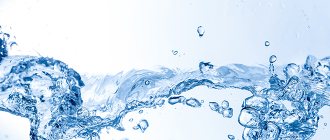The human body consists of 50 to 80% water, depending on weight. Many people are dehydrated and don't even know it. Lack of fluid in the body can lead to serious negative consequences - that's why you need to drink a lot of water. It is necessary to replenish your water balance on time in order to feel healthy and protect yourself from all sorts of diseases.
They say a person needs to drink 2.5 liters of water a day
Everyone has probably heard the myth that you need to drink 2.5 liters of water a day. Many people, having decided to improve their health, begin by setting the goal of drinking as much water as possible.
Where did this advice come from?
This recommendation can first be found in the article “Recommended Dietary Allowances,” published in 1945 by the staff of the US Nutrition Commission. It stated that most adults need 2.5 liters of water per day (about 1 ml for each kilocalorie of daily intake).
However, the same article stated that a significant portion of the required amount of water is found in foods and drinks. This means that we get fluid not only from water, but also from soups and cereals, fruits and vegetables, tea and coffee. Examples of how much water some vegetables and fruits contain: cucumber is almost 97% water, tomato and pepper are 94% water, pineapple and orange are 87% water, raspberries and blueberries are 85% water . In addition, a certain amount of water (approximately 300 ml) is synthesized in the body as a result of chemical reactions (as a result of the oxidation of organic compounds).
At the same time, on average, the human body excretes 2.5 liters of water per day: 1.5 liters with urine, 500 ml with sweat, 400 ml with exhaled air, 100 ml with feces.
Conclusion: our need for liquid can be covered not only by water, but by other liquid (milk, juice, compote, tea) and solid (vegetables and fruits) products. Most healthy people can maintain fluid balance in their bodies without specifically calculating how much they need to drink. You can just drink when you feel thirsty.
Diet food
Human kidneys work best when the owner leads a healthy lifestyle and eats a healthy diet. But there are foods that have the most beneficial effect on this organ. Scientists have found that their regular consumption reduces the risk of many kidney diseases.
Vitamin A has a beneficial effect on the functioning of the paired organ, but it is not recommended to use it in synthetic form without indications, since you can overdo it with the dosage, and this already causes harm to the body. The optimal solution is to consume foods high in vitamin A. Their intake does not need to be monitored, since they contain carotene, a natural provitamin.
Pumpkin is rich in vitamin A, its pulp is especially useful. This vegetable prevents the formation of sand and kidney stones. Pumpkin seed oil is also useful; it is well suited as a dressing for vegetable salads. There is a lot of this vitamin in carrots, cabbage, and bell peppers.
The work of the kidneys is facilitated by fresh herbs, almost any will do. This could be cilantro, parsley, leeks, celery, etc. Greens have a beneficial effect on all internal organs, nourishing their walls. You can add it to any dish - salads, soups, complex side dishes, meat or fish snacks.
To prevent kidney disease, the body requires minerals, which can be obtained from fish. However, in case of kidney failure, it is forbidden to eat fish, as it contains phosphorus in large quantities, which can negatively affect the functioning of the filter organ.
Watermelon, which has diuretic properties, cleanses the entire body and kidneys well. Its alkaline compounds have a mild anti-inflammatory effect. Effective as a preventive measure for urolithiasis due to the minerals and vitamins included in its composition.
But table salt negatively affects the functioning of the kidneys, but you can’t completely give it up either - it’s harmful to other organs. You need to salt food in moderation; for a healthy person, the daily dose of table salt is 5 g, and in the presence of kidney diseases it is reduced to 2-3 g per day.
All people have the same fluid needs
In fact, the body's need for fluid depends on many factors: weight, gender, age, physical activity, climate. The daily fluid requirement can vary from 2 to 16 liters per day, depending on the severity of the work performed and the degree of heat exposure. It is influenced by various physiological (for example, breastfeeding increases the need for fluid by 750 ml-1 l) and pathological conditions (fever, vomiting, diarrhea).
However, there are certain recommendations for fluid consumption. Thus, the Institute of Medicine of the US National Academy of Sciences recommends 2.7 liters (for women aged 19-30 years) and 3.7 liters (for men aged 19-30 years). 81% of this amount comes from various liquids (water, tea, juice and others), 19% comes as part of food.
How to understand that an organ has been seriously damaged
This will be shown by the symptoms that occur after drinking. A person exhibits the following symptoms:
- he is constantly thirsty;
- bruises and swelling form under the eyes;
- blood pressure drops sharply;
- the heart begins to beat rapidly;
- urine color changes;
- a person often runs to the toilet in a small way;
- severe pain in the back area;
- body temperature may increase;
- Photophobia and headache appear.
Usually, paired organs hurt after heavy drinking, when they are tired of performing their function. In those people who are obese or have a predisposition to arterial hypertension, the pressure often does not decrease, but increases.
Along with the kidneys, alcohol affects the pancreas, which is why it sometimes hurts in the hypochondrium area.
Humans are more than 70% water
In fact, the amount of water in the body depends on gender, age, and the ratio of fat and muscle mass. Women, for example, have less total body water on average than men due to less muscle and more fat tissue.
The body of a child in the first months of life actually consists of more than 70% water. With age, the amount of water in the body decreases: in women and men 19-50 years old, this figure averages 50% and 59%, respectively; in women and men over 50 years old, this figure averages 47% and 56%.
They say if you drink a lot of water you can lose weight
Although water is important for many processes that occur in the body, this does not give reason to believe that water promotes weight loss. Other factors that influence a person's weight include diet, physical activity, hormones, genetics, and some medications.
But it's not that simple. If a person drinks enough fluid, the volume of his blood, cells, and the level of antidiuretic hormone (the main task of this hormone is to maintain water and electrolyte balance in the body) is normal. If not enough, the level of antidiuretic hormone increases. Chronic elevation of antidiuretic hormone may promote weight gain.
Why can your kidneys hurt from alcohol?
To filter fluid, the kidneys have nephrons, which consist of small sections.
The blood is purified as it moves through these sections. The destructive effect of alcohol is due to the fact that toxic compounds tend to accumulate and destroy nephrons. People are interested in the question of why their kidneys hurt from alcohol. Here are the main ones:
- Alcohol-containing products have a diuretic effect. Beer can cause kidney pain, since after drinking it the urinary system is heavily loaded, as a result of which the kidney tissue becomes thinner.
- Filtration failures. Alcohol (alcohol) in the stomach is oxidized to toxic substances, which subsequently enter the kidney tubules. Because of this, primary urine is poorly formed, and the blood is cleared slowly. Electrolyte imbalance occurs. This is especially noticeable with a hangover. After drinking large amounts of alcohol, the amount of potassium in the body drops sharply. As a result, dehydration (dehydration) occurs. A person is constantly tormented by thirst, vomits, feels sick, and experiences pressure changes.
- Proteinuria appears. Proteins are abundantly washed out of the body. Even if the alcohol intake was only once, aching pain in the kidneys may appear.
They say drinking a lot of water is good for your skin.
And it is true!











